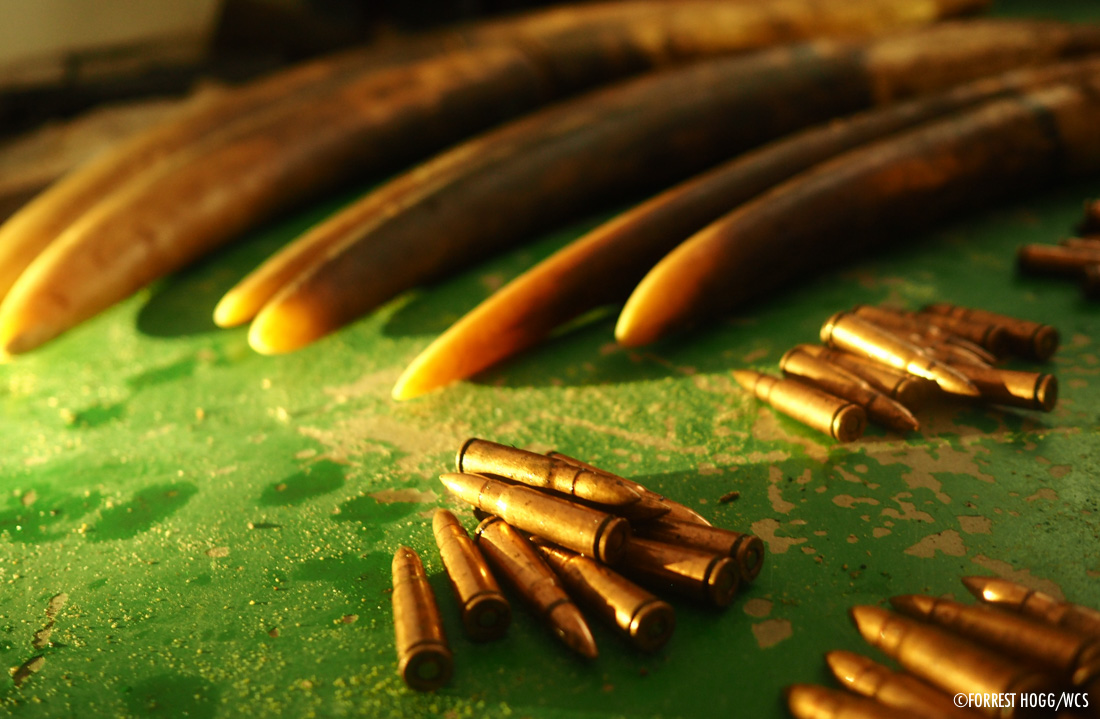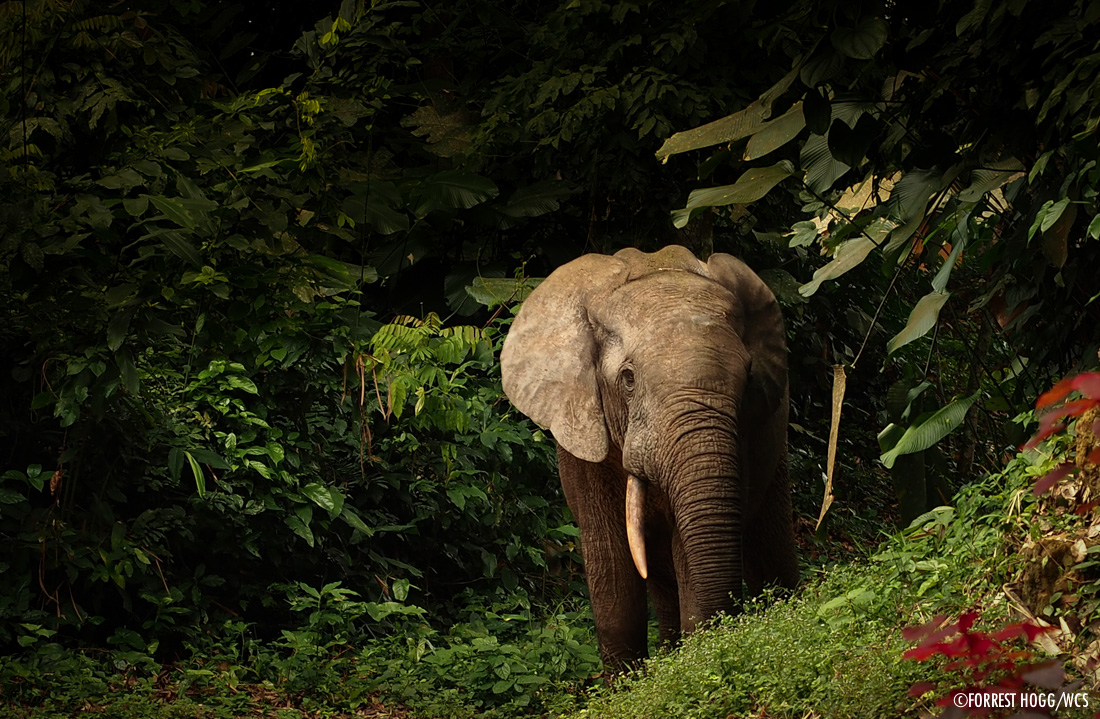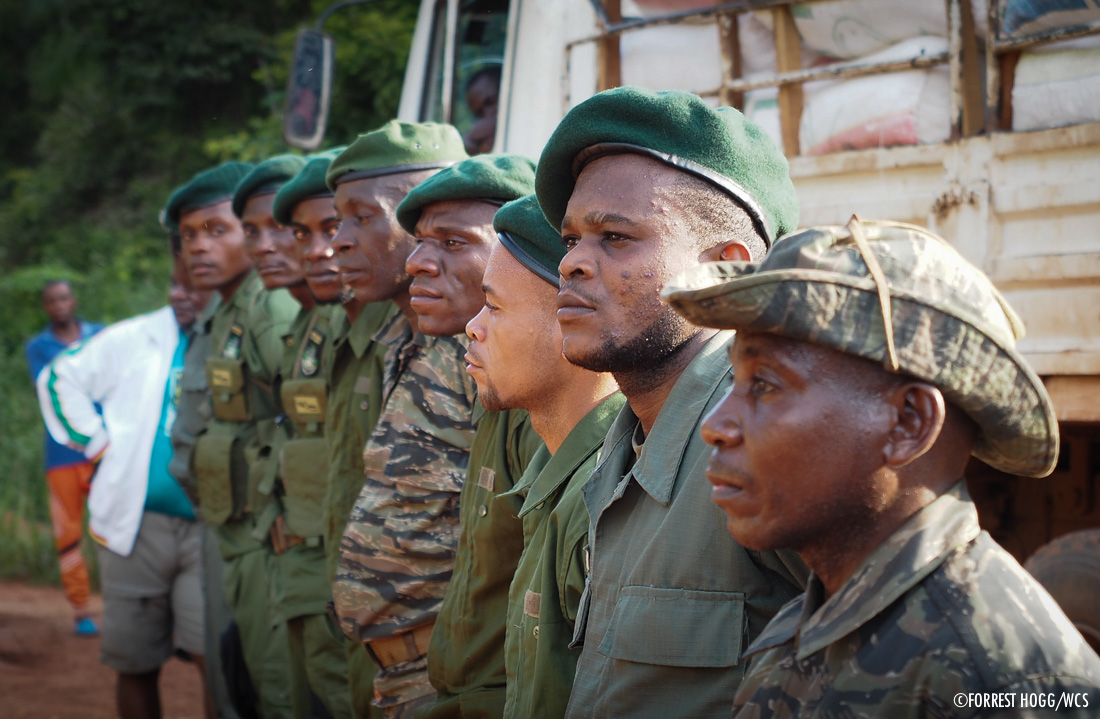
Dismantling northern Congo’s trafficking networks
The fight to protect northern Congo’s forest elephants has reached boiling point. In the past two months 32 poachers have been arrested, over 100 kilograms of ivory seized and six semi-automatic weapons detained across the Ndoki landscape. This includes the arrest of an ivory trafficker tied to one the most notorious poaching rings in northern Congo.
With increased coverage, manpower, and the use of real-time communications technology, rangers are bringing the fight to poachers. An increase in the number of armed confrontations between rangers and poachers over the past month is a critical indicator of the changing climate of conservation in the region.
Where remoteness has long provided a blanket of protection for the Ndoki forest, today’s rapid encroachment of logging roads outside the Park limits, alongside a fast growing population and a ten-fold rise in the local price for ivory, has brought unprecedented levels of illegal hunting. Ivory trafficking networks continue to flourish in Congo and across the border to Central African Republic and Cameroon. These networks are exploiting new communication and transport links that arrive with logging.

Almost one quarter of the worlds remaining forest elephants reside here in northern Congo. Having suffered a serious decline of more than 60% across Central Africa over the past decade, protecting these elephants and their forests is of global importance.
Hunting forest elephants is a perilous and arduous task requiring both forest knowledge and heavy caliber weaponry. Once slaughtered, the elephant’s ivory can be difficult to shift without the right contacts. Ivory poaching and trafficking is therefore controlled and financed by a select group, locally referred to as ‘patrons’, who set up shop in logging towns, provide poachers with weapons and commission elephant hunts.
Forrest Hogg, WCS advisor on anti-poaching for Nouabalé-Ndoki National Park, further explains the situation. “Elephant poachers on the ground are easily replaceable; there is a large pool of individuals who are willing to do this work. The patrons, the individuals who are reaping the biggest benefit from poaching, take longer to replace. These individuals are well financed, well equipped and, most importantly, well connected. Even an arrest of a patron [not necessarily a conviction] can slow the tide of poaching by taking weapons out of circulation and disrupting poaching activities.”
”The Wildlife Conservation Society’s newly established Wildlife Crime Unit offers unprecedented access to the higher-level players in the Congo’s northern poaching circles. Effective application of Congo’s wildlife laws relies on a watertight law enforcement chain – from the forest patrols to the court trials. Evidence must be well documented, cases put forward with coherence and justice served. - Mark Gately, the WCS Congo Country Director
However, taking down the patrons requires an integrated approach; on the ground patrols coupled with intelligence driven operations within market centres. In July, a ranger team on a routine forest patrol startled a group of poachers on the Ndoki River, a notorious poaching corridor that leads to the Park. Following the encounter a specialist force of rangers, was deployed to contain the fleeing poachers.
Three days later, the unit stopped a suspect crossing the containment zone and was transferred to the Wildlife Crime Unit (WCU). Coincidentally, the suspect had been subject to an ongoing undercover investigation, which had him tied to a chief poaching ring operating in northern Congo implicated in a major ivory deal the month prior (June 2016). This intelligence was used to leverage several critical admissions, including the denouncement of fellow ringleader, leading to both their arrest. Following his initial hearing, he will face the court again in November and could potentially face a five-year sentence.

As Mark Gately, the WCS Congo Country Director explains “the Wildlife Conservation Society’s newly established Wildlife Crime Unit offers unprecedented access to the higher-level players in the Congo’s northern poaching circles. Effective application of Congo’s wildlife laws relies on a watertight law enforcement chain – from the forest patrols to the court trials. Evidence must be well documented, cases put forward with coherence and justice served”.
The just conviction of this notorious ivory trafficker could signal a significant change for elephant conservation in Congo. A strong message would be sent to all poaching networks across the Ndoki landscape that wildlife criminals cannot go on breaking the law with impunity, a positive shift in ensuring the future of elephants in Ndoki is secured.
The Wildlife Conservation Society’s protection work in northern Congo is supported by US Fish and Wildlife Service, USAID CARPE, European Union, the Wildcat Foundation, Liz Claiborne and Art Ortenberg Foundation, Elephant Crisis Fund, and the Sangha Tri-National Foundation.


Caroline Wilkins
I salute these rangers. They are courageous men. I wish them “bonne courage avec leur boulot” – they are doing an amazing job…..it makes me feel very, very small. They HAVE to win before we have eradicated these magnificent animals, the thought of which is unbearable.